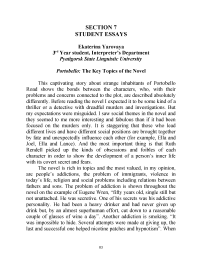Portobello: the key topics of the novel
Автор: Yarovaya Ekaterina
Журнал: Тропа. Современная британская литература в российских вузах @footpath
Рубрика: Student essays
Статья в выпуске: 5, 2011 года.
Бесплатный доступ
Короткий адрес: https://sciup.org/147228683
IDR: 147228683
Текст статьи Portobello: the key topics of the novel
This captivating story about strange inhabitants of Portobello Road shows the bonds between the characters, who, with their problems and concerns connected to the plot, are described absolutely differently. Before reading the novel I expected it to be some kind of a thriller or a detective with dreadful murders and investigations. But my expectations were misguided. I saw social themes in the novel and they seemed to me more interesting and fabulous than if it had been focused on the murders only. It is staggering that those who lead different lives and have different social positions are brought together by fate and unexpectedly influence each other (for example, Ella and Joel, Ella and Lance). And the most important thing is that Ruth Rendell picked up the kinds of obsessions and foibles of each character in order to show the development of a person’s inner life with its covert secret and fears.
The novel is rich in topics and the most valued, in my opinion, are people’s addictions, the problem of immigrants, violence in today’s life, religion and social problems including relations between fathers and sons. The problem of addiction is shown throughout the novel on the example of Eugene Wren, “fifty years old, single still but not unattached. He was secretive. One of his secrets was his addictive personality. He had been a heavy drinker and had never given up drink but, by an almost superhuman effort, cut down to a reasonable couple of glasses of wine a day”. Another addiction is smoking. “It was impossible to hide. Several attempts were made at giving up, the last and successful one helped nicotine patches and hypnotism”. When
Eugene had finally given up his bad habits he began to put on weight and as he was a secretive person he “did his best to keep it secret” from his girlfriend Ella. The only way to avoid weight he found in eating “slimming sugar-free, healthy food-friendly” sweets called Chocorange which had “a rich chocolate flavours with a hint of sharp citrus ”. Eugene Wren tried to fight his foibles throughout the novel and sometimes he coped with them for a while. But nevertheless this addiction played a key role in his further life.
The next important topic of the novel is violence. It started from Gemma, Lance’s girlfriend “whose eye he had blacked and tooth he had knocked out”. Then it turned to Lance himself when two immigrants Ian Pollitt and Feisal Smith took revenge for Gemma. They both committed the arson of Uncle Gib’s house and as a result Lance was found guilty of the crime. But the cooperation of Ian and Fize didn’t last long since Ian killed Fize in a fight while being drunk. It is necessary to say that Rendell pays great attention to the behavior of characters during the crimes. She describes their thoughts, intentions and goals.
The problem of immigrants is also touched upon in the novel. I’ve already mentioned two immigrants Ian Pollet and Feisal Smith who didn’t lead a proper life and did tricks instead of looking for a job in order to earn money. In my opinion, they resented their life, that’s why they worked off their bad feelings on other people, for example, Lance, though he wasn’t absolutely innocent. Finally “Old Harry” played with Ian and Fize, the former was convicted of a crime and the latter was killed by his own partner in crime.
The problem of fathers and sons is still of immediate interest and the author pays a particular attention to it in her novel. It is considered as relations between Joel Roseman and his father. Joel wasn’t a common boy. «He had an imaginary friend from the time he was seven». After the death of his sister, Joel suffered from his father who was convinced that his daughter had died because of his son. Joel’s father didn’t accept him as a son and even didn’t want him to live in the same house with him. He didn’t forgive his son and this fact influenced greatly. At last a sort of mystery happened to Joel and he became Mithras, his imaginary friend and only then Joel’s father could accept him, not his son but «this man». This is also a matter of concern related to inner grievance and unwillingness to forgive. It is a question whether to lose one child or two, and actually, Joel’s father chose the second way.
And the last but not less important key topic is religion. It appears practically in every book but in different ways. In «Portobello» the problem of religion is tightly linked to Albert Gibson, a former burglar. After his fourth term of imprisonment he profoundly changed his life and became the leader of the children of Zebulun. But as we know, it is possible to change an appearance but not the soul. In my opinion, Uncle Gib remained the same person with his bad habits, for example, smoking.
To conclude I can say that the whole set of key topics in the novel is shown in detail and the main advantage of it is that the author explores them disclosing all the secrets of the characters.


